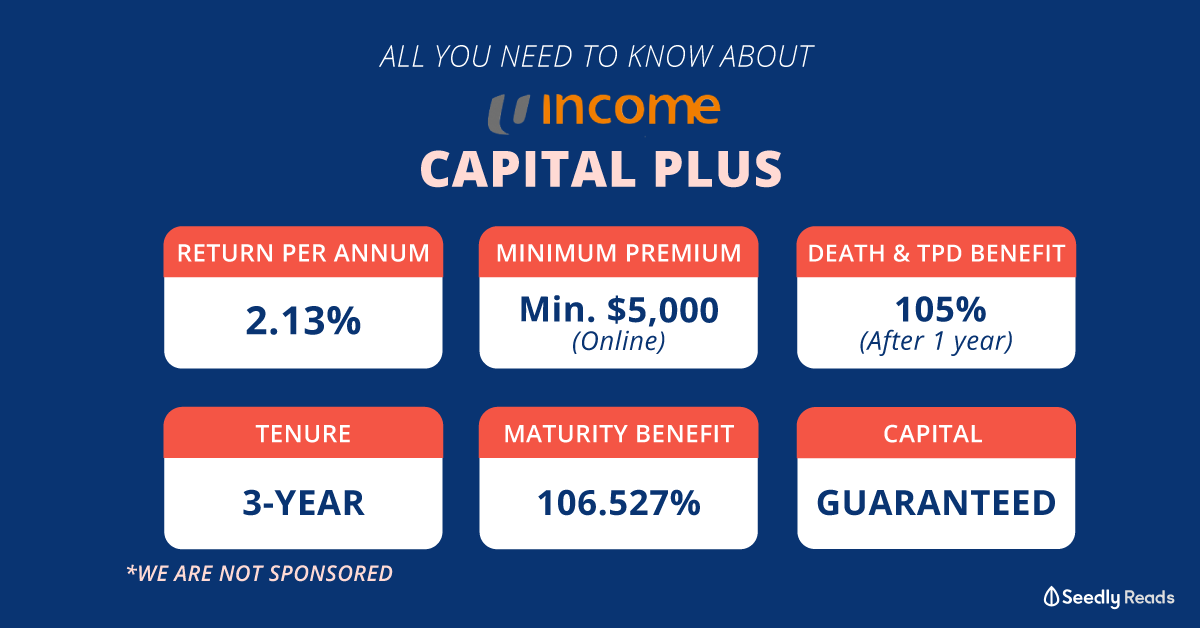Advertisement
Anonymous
Difference between endowment and ILP plans?
Bought a 15 year Prudential plan thru a bank and started paying for 2 years. The intent is to invest n save. However Just read up more about insurance knowledge through Seedly and found that the real return of the plan is 2.5% instead of what the agent claim as projected 4.75%. And there is non-guaranteed amount too. Hope to know from the community and awareness about insurance and investment and whether should I surrender the plan?
16
Discussion (16)
Learn how to style your text
Soon Xiaohui
07 Jun 2019
Analyst at Common Place
Reply
Save
Endowment plans, in layman terms, can be considered as setting aside a sum of money for savings. The goal is to help you save over a no. of years.
Investment-Linked Policies, or ILP, is setting aside the money for investments, specifically, into unit trusts, while keeping a portion for insurance.(They either sell units to pay for insurance, or part of your premiums paid is spent on insurance.) Newer version allows you to deploy 100% into investments. As they deal with investments, past performance does not indicate further results; and there is always a possibility that you may lose your capital.
For both endowment and ILP, they have guaranteed and non guaranteed figures. Guaranteed figures are guaranteed, ie, you will definitely receive it when the plan reached maturity. However, this is where the differences lie.
As ILP uses the premiums to invest, chances are, there is little/no guaranteed figures. The non-guaranteed portion can be higher as they may get higher returns.
Endowment uses the funds to deal with lower risk products. As such, the % returns are generally lower.
As to whether you should surrender, there are a few things to consider.
a) what protections are you giving up,(if any) when you surrender the policy? Can you buy a substitute, e.g. Term life, whole life, etc.
b) are you good at investing? Are there strategies you can use to invest, e.g. DCA(Dollar Cost Averaging) on an index funds, stock picking, property selecting?
Hope this helps. If in doubt, just ping me or the commmunity.
Reply
Save
Png Cheng Xi Damien
07 Jun 2019
Happy Life Seeker at Home
My advice is simple. Go confront the bank who sold you the product claiming 4.75%. If you were misle...
Read 2 other comments with a Seedly account
You will also enjoy exclusive benefits and get access to members only features.
Sign up or login with an email here
Write your thoughts
Related Articles
Related Posts
Related Posts
Advertisement









Hello, actually it is not advisable to comment on whether you should surrender the plan; especially if we are licensed representative. This is to prevent another agent/adviser to missell you another product. However we can highlight the important factors for you to decide.
Point 3 should used in any finanical planning at all times.
Additionally, if you bought your plan based under the impression that it will give you the return of the projected figure 4.75%, you may approach the bank to confront on this plan or raise a case with MAS and FIDREC. If it is proven that there's a breach, they will return you the money, or accord you the claimed returns.
In my personal opinion, I do not calculate 100% of the non guaranteed amount as there is incident (in the past) that bonus is not being paid. Therefore, I do kinda of agree of the calculation found, https://blog.seedly.sg/guide-basics-endowment-p...
usually I will give a range as we should never guaranteed the non guaranteed amount.
As for ILP, it is an investment plan however it does not invest into unit trust directly (common misunderstanding) . The correct defination - ILP is invested into sub-funds which may feed different assets (fund trust, etf through a fund house). This is documented under Product Highlights Sheet. The attached images are how a Product Highlights Sheet may look like.
ILP has its own advantages & disadvantages however it does not suit everyone. If you are solely interested in investing assets such as unit trust, you may open an investment account to direct invest into it.
In the meantime, if you have any question(s), you may drop me a message via facebook. Wish you all the best.